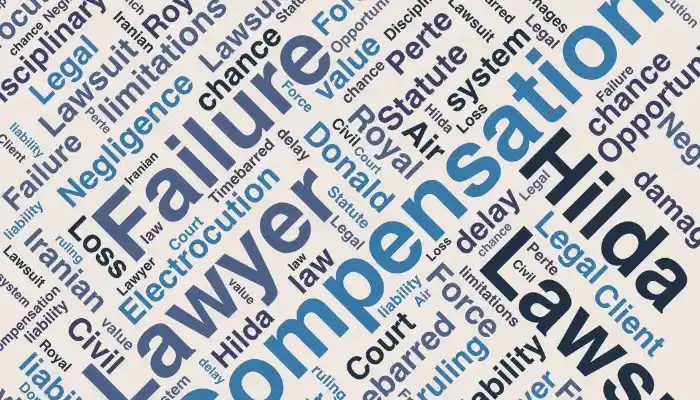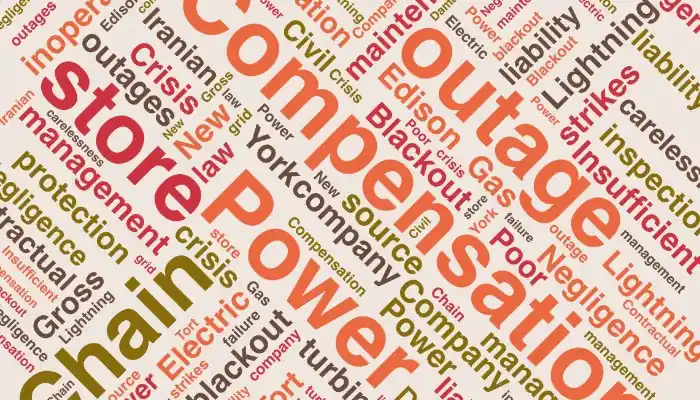Hilda’s husband was a senior officer in the Royal Air Force of England. One morning, while he was on leave, he went to the kitchen to make tea. He switched on the main power in the control box, and… in that very moment, he died; he had been electrocuted.
Hilda was certain that the electricity company was responsible for her husband’s death. She decided to pursue the matter in court and sue the electricity company. For this reason, she approached Donald, who was a lawyer. Hilda entered into a contract with Donald to file and pursue a lawsuit against the electricity company on her behalf.
However, after some time, Hilda filed a lawsuit against Donald! The reason for this was that Donald had failed to file her lawsuit in a timely manner. He had delayed the case so much that, according to the laws of England, the case became time-barred, and Hilda could no longer file her claim. (In simple terms, a “statute of limitations” means that after a certain period, one can no longer file a lawsuit or claim in court. For example, in Iran, the statute of limitations for filing a complaint in crimes such as defamation is generally one year from the date of the offense, and after this period, the complainant can no longer file a criminal complaint against the offender.)
Hilda claimed that due to Donald’s negligence, she had lost a valuable opportunity. The court ruled in Hilda’s favor and ordered Donald to pay compensation, as it believed that this negligence had deprived Hilda of her chance to seek justice.
Although Donald argued that the chances of Hilda winning the case against the electricity company and proving liability were very slim, the court declared that Donald had allowed the case to be lost due to the statute of limitations. The fact that no effort was made even to preserve the case was unacceptable, even if convicting the electricity company had indeed been impossible.
According to Iranian law, however, a lawyer is only responsible for compensating the client’s damages if the harm caused to the client directly results from the lawyer’s mistake or negligence. In simple terms, it must be shown that the damage suffered by the client is the direct result of the lawyer’s wrongful conduct, and the client must prove that if the lawyer had fulfilled their duty, the ruling would have been in the client’s favor. Otherwise, even if the lawyer committed a disciplinary violation, they would not be liable for compensating the client’s damages.
Therefore, if Hilda were in Iran, she would have had to prove that she would have certainly won the case against the electricity company. Merely losing the chance to convict Donald would not have been enough.
The loss of chance and the possibility of compensating for the damages arising from it is one of the key issues in the matter of compensation. However, in many countries around the world, social and economic developments have led to the recognition of chance as a legal value. For example, the Supreme Court of France, in relation to a lawyer’s responsibility, views the loss of chance as equivalent to losing a valuable opportunity, and considers the damage caused as compensable based on the potential benefit the individual could have gained. In a ruling, the French Supreme Court declared that a lawyer’s negligence in pursuing a client’s case is seen as the loss of a chance for victory, and the damage resulting from it is considered compensable.
However, the argument that in all cases, the loss of chance should be considered the same as losing a valuable opportunity does not seem entirely correct. This is because the damage caused by losing a chance is, in essence, a form of loss of profit, which has been accepted under specific conditions in the French legal system. In fact, in the French legal system, the loss of chance (perte de chance) has been recognized as a compensable type of damage under certain circumstances. This acceptance stems from the fact that chance, although probabilistic, can hold significant value in some cases, and losing it may result in real harm. For instance, when there is an opportunity to achieve a positive outcome, losing that opportunity due to someone’s negligence or mistake can lead to a claim for damages.
What do you think? Do you consider the mere loss of chance sufficient for compensation? Or do you believe that it should be proven that achieving the desired outcome was more than just a chance and was certain?
Sources:
Thomas Kadner Graziano, Andrew Tettenborn, Christopher Booth, Mo Comparative Tort Law-Cases, Materials, and Exercises (2018, Routledge) libgen.li
Shayegan, Esmail. 2016. “Civil Liability of Lawyers in the Case of Loss of Chance in the Jurisprudence of the French Supreme Court.”
Abbaslou, Bakhtiar. 2018. “Civil Liability (with a Comparative Perspective), Tehran: Mizan.”




